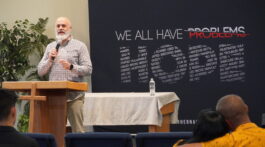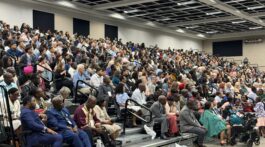Delegates of the 2015 General Conference Session voted “No” today to the carefully worded proposal that would have allowed the 13 divisions of our world church to each decide for themselves whether or not to make provision for the ordination of women to the gospel ministry within their own territories. The vote, conducted by secret paper ballots, was 977 in favor of divisions deciding and 1,381 opposing it.
This vote does not determine whether or not women can serve as ministers. The Seventh-day Adventist Church has already decided that women may serve as credentialed ministers. As several delegates pointed out during floor speeches (including special guest former GC president Jan Paulsen), this vote was not about whether female pastors should be ordained, but who should decide whether or not to ordain them.
Dan Jackson, president of the North America Division, said that regardless of whether or not they are ordained, the 107 women pastors currently laboring in the NAD will continue serving their churches and communities. “We will continue with our intention of placing as many women into pastoral ministry as possible. We affirm the important role they play in reaching all of God’s children,” Jackson said.
In the Mid-America Union Conference, our administrators say they will continue the current practice of recommending ordination for males and commissioning for females. “As this is the standard policy and has been for the last couple of decades, the Mid-America Union will continue its present approach to this procedure,” said Gil Webb, vice president for administration.
Ordination of elders unchanged
Neither does today’s vote change the current GC policy on the ordination of women as local church elders, as stated in the 2009 Seventh-day Adventist Minister’s Handbook, p. 94: “Elders and deacons should be persons of experience, chosen wisely. By action of the Annual Council of 1975, reaffirmed at the 1984 Annual Council, both men and women are eligible to serve as elders and receive ordination to this position of service in the church.”
Nor does this vote limit the mission of the global church’s Women’s Ministries departments in carrying forward their work. Nancy Buxton, Mid-America Union Conference Women’s Ministries leader, points out that Women’s Ministries is not about ordination. “We have never promoted the ordination of women,” she said. “Women’s Ministries is about ministry—it’s about helping women be all God created them to be as leaders, teachers, friends and yes, pastors. Our ministry involves a caring, loving relationship with each other within the church and community.”
Proper procedures followed
Today’s proceedings, chaired by GC vice president Michael Ryan, were orderly, well explained and bathed in prayer. Multiple times during the day delegates paused for sessions of earnest prayer.
In his morning remarks GC president Ted N.C. Wilson sincerely requested that the discussion be civil and allowed to continue without anyone calling question or proposing amendments.
Before discussion began three documents were read aloud: Theology and Practice of Ministerial Ordination, Consensus Statement on a Seventh-day Adventist Theology of Ordination, and the three positions from the Theology of Ordination Study Committee report, all based on Scripture. The words were also displayed on the screen and included in delegates’ packets.
History of the debate
The Seventh-day Adventist Church has been periodically wrestling with this topic for nearly 100 years. Adventist historians report that between 1870-1900 over 20 women received ministerial credentials from the Seventh-day Adventist Church, Ellen White among them. These women served as evangelists and in pastoral roles. They were paid from tithe funds—with Mrs. Whites’ approval—but there is no record of them being ordained.
According to a report given during preliminaries this morning, there have been numerous committees through the years tasked with exploring this topic and bringing a recommendation. In most cases, there was “failure to reach consensus” and the matter was referred for “more study.” (www.columbiaunionvisitor.com/timeline-the-road-to-ordination)
In June 2014 the 106-member Theology of Ordination Study Committee, which had analyzed 65 papers and presentations for 18 months, voted by a two-thirds majority to recommend that each division be allowed to determine its own trajectory on this matter. For an in-depth analysis of where the authority for ordination lies see Who Runs the Church? Understanding the Unity, Structure and Authority of the Seventh-day Adventist Church.
However, in October 2014 the GC and division officers declared unanimously that the issue should be determined through a process of church discussion and voting. Members of the Annual Council voted to place before the 2015 GC Session the question that was voted today: “After your prayerful study on ordination from the Bible, the writings of Ellen G. White, and the reports of the study commissions, and; after your careful consideration of what is best for the church and the fulfillment of its mission, is it acceptable for division executive committees, as they may deem it appropriate in their territories, to make provision for the ordination of women to the gospel ministry? Yes or No.”
Strong opinions and prayers for peace
Because our theologians have not been able to reach consensus, many Adventists have concluded that this is a point of church procedure, not a theological issue. In an article in the July/August 2015 Elder’s Digest, Ekkehardt Mueller says, “The ordination debate has nothing to do with the Bible’s most fundamental teachings. It does not belong to the core of Adventist beliefs.”
However, as evidenced during today’s debate, many other Adventists believe this is a matter of Scriptural integrity and firmly hold that the church would have strayed from God’s plans if the vote had been “Yes.” With 59% of the delegates voting “No” to 41% voting “Yes,” it is clear that opinions are strong on both sides of this question.
One female pastor who has served the NAD in various churches for 19 years says she is saddened by the unkind words and lack of Christian courtesy that has surrounded this debate. “I know that is not Jesus speaking,” she said.
I have never spent one minute fighting for ordination and I never will. But it breaks my heart that the church I love and passionately serve chooses not to acknowledge my calling or the fruits of the ministry God has given me.
She added that she is “praying earnestly for the grace to accept the vote and begging God to give me peace, patience and the right attitude to continue being the light and sharing the light that He gives me.”
Related from Barna Group: Five Factors Changing Women’s Relationships with Churches
Photo Credit: Rohann Wellington










